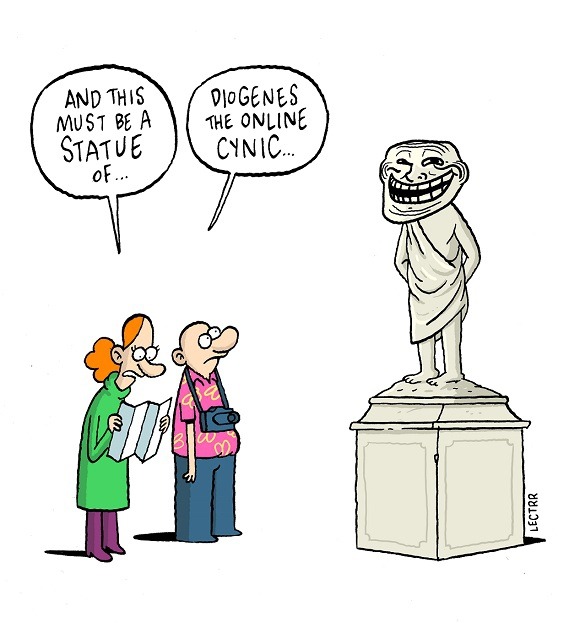Are we living in an age of cynicism? Surely it must be too cynical a statement to answer that question affirmatively. Yet scrolling through one’s feed on social media, one cannot help but wonder: maybe we are.
Whenever people engage for a cause they deem worth fighting for, others seem excessively eager to display their cynical disdain. It’s not only the usual troops of trolls, who are ready to fire their tweets of disparage. Leading intellectuals too readily jump on the bandwagon.
The recent Youth for Climate-protests in Brussels are a case in point. The initiative of youngsters skipping class in order to participate in the protests received both praise and has drawn criticism. There is nothing wrong with criticism and there are legitimate ways to express legitimate concerns. Evidently, a wide set of motives may lie behind the acts of the youngsters. Idealism, sure. But group pressure too will play a factor. And so will a thirst for some excitement.
Being critical however is quite different from being cynical. And it has to be pointed out that many of the comments and reactions on social media were deeply cynical. Such reactions give reason to worry, not only because they target minors, both individually and as a group. But also because there is something intrinsically wrong with cynicism.
Youth for Climate
“Let’s organize a protest march on a Saturday, and we’ll see how much these youngsters care.” “Those spoilt brats are deeply concerned about the environment, with all their iPhones and cheap flight holidays.” “There are 11 million people living in Belgium. There are 7.7 billion people in the world. And thousands of youngsters in Brussels will make a difference?”
Those were among the kindest of disapproving tweets and posts. A picture that was shared countless times, showed a meadow after a music festival, with litter scattered all over. Above the picture the words: Youth for Climate. Where does such cynicism come from? And why bother about it?
Conceptualizing cynicism
Conceptualizing cynicism is not an easy thing, as the term has been given very different meanings throughout the ages. In Ancient Greece, cynicism was a way of life; an attempt to be true to one’s true nature and to live a virtuous life. Diogenes, the most famous member of the “cynical school” believed this required people to get rid of their feelings of shame and not to suppress but to set free their sexual desires. Another ancient cynic, Antisthenes, believed cynicism to be a critical attitude towards accepted social norms and practices that required the renunciation of worldly power and materialism.
Enlightened but false
If cynicism were indeed merely the adoption of a critical stance towards the world we live in, one could hardly have any objections to it. But cynicism today doesn’t mean what it did more than two thousand years ago. And it definitely has a more negative connotation now.
Peter Sloterdijk offered an interesting definition of cynicism, calling it “enlightened false consciousness”. And if we are to believe the German philosopher, we are already living in an age of cynicism. In his book Critique of Cynical Reason (1983), he develops his views and calls cynicism a salient feature of man in the postmodern world. According to him, modern cynicism results from the death of God and the end of the great all-encompassing narratives of life. Life is absurd, lacking a deeper meaning. And many people tend to fill the moral void that arises from this belief with cynicism.
Looking down
Obviously, “enlightened false consciousness” is probably not the first thing people think of when asked about the meaning of the word cynicism. In plain terms, cynicism is commonly understood as the belief that people are only interested in their own good and incapable of really caring for the good of others.
However, to me cynicism is more than just that. It is not only thinking that people don’t really care; it also implies looking down on those who do seem to care. The trademark of the cynic is a disdain for the good others strive for. As such, cynicism is a moral problem; a failure to value what is valuable. Oscar Wilde was spot on when he said, “A cynic is a man who knows the price of everything, and the value of nothing.”
Idle endeavours
A cynic is not morally indifferent, neither is he a nihilist. He is not indifferent to the difference between good and evil. Rather he is disappointed in and disillusioned by the good people can do. And he reacts by taking a certain amount of pleasure in emphasizing the moral inadequacies of others: the futility and idleness of our moral endeavours.
A cynic is someone, who responds to the Ice Bucket Challenge by posting a picture of emaciated African children, accompanied by the message that while they die of thirst, we spill buckets of water. He will say people do charity to make themselves feel better, not because they care for others. And he is always ready to undermine the moral integrity of those with whom he disagrees, by making use of a word that has become the crown jewel of the cynics’ vocabulary: Gutmenschen or do-gooders.
A rhetoric strategy
Cynicism has become a common rhetorical strategy in the public debate, and the recent popularity the terrible term Gutmenschen has enjoyed is proof of that. But contrary to what those who adopt the strategy believe, cynicism is not a powerful weapon, nor a convincing argument. It is in fact intellectual laziness. A cynical comment can put a wry smile on the face of those who already sympathize with our own views.
It is never aimed at trying to convince those who think differently than we. Neither is it an attempt to open ourselves to views that are not ours. As such, cynicism is a means to avoid a real debate, a way of discrediting the intellectual and moral integrity of the other, so you don’t have to take his standpoint seriously. Yes, it is true: students skipping class might not solve our problems. But neither will any cynicism about them.
By Alicja Gescinska


